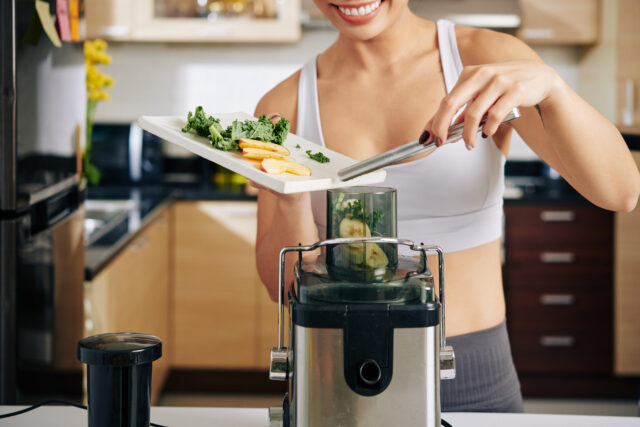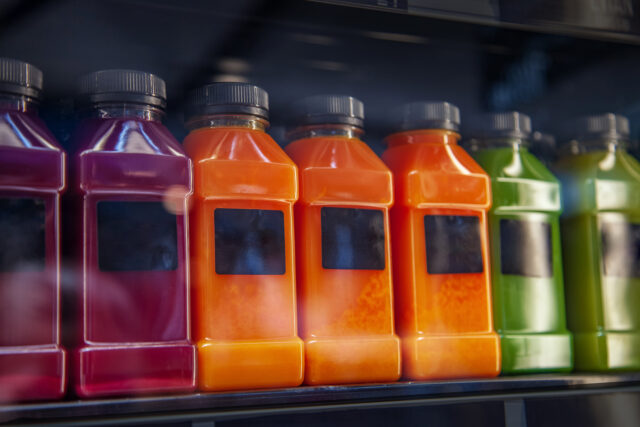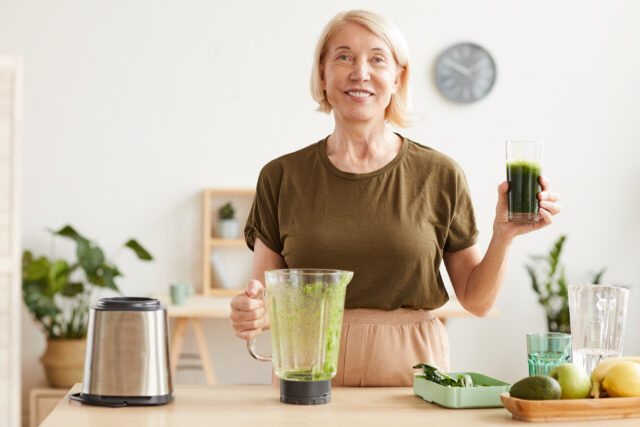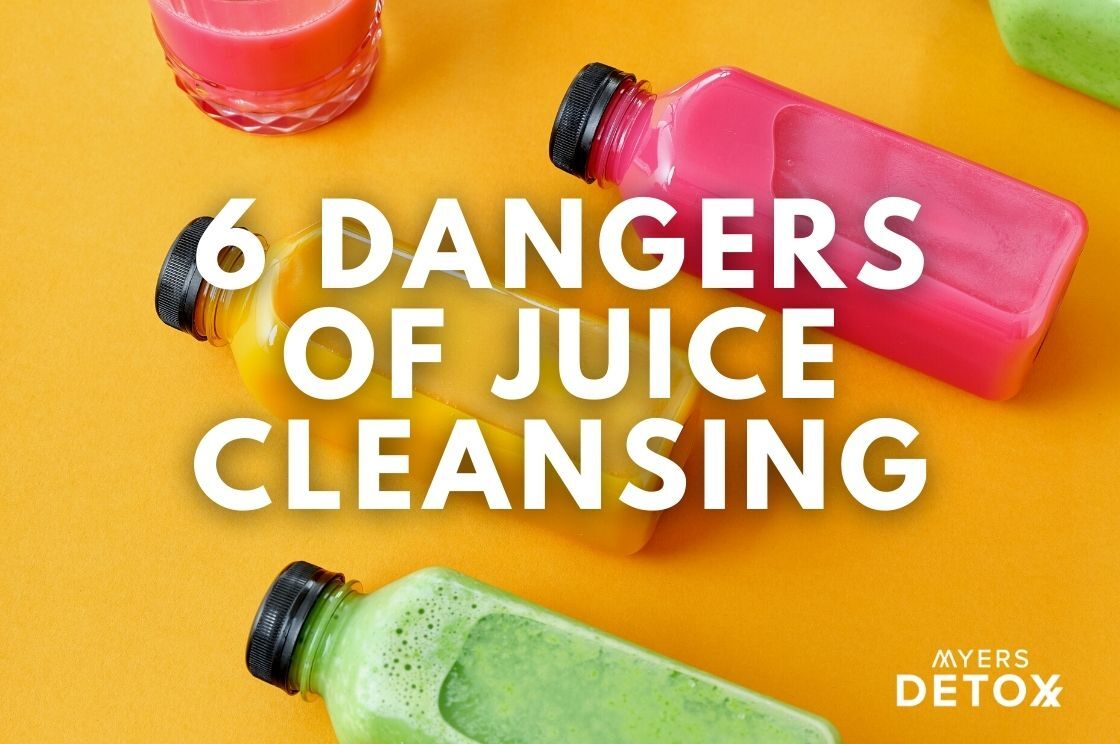Thinking of doing a juice cleanse? Read this first.
It seems as though every year, there are a handful of new diet approaches that come and go in the health and wellness scene. One dieting and detox strategy that’s stuck around for quite a while is juice cleansing.
While many people report feeling amazing on a juice cleanse, there are some serious downsides that tend to get lost in the marketing noise. Instead of delivering on its promises, juice cleansing can actually work against you in your journey towards health.
In this article, we’ll discuss
- Why people are drawn to juice cleanses
- How juice cleanses trick you into thinking they’re benefiting your health
- Why juice cleansing is actually one of the worst things you could do for weight loss
- The long-term downsides of forgoing food for juice
- A simple solution to get the benefits of juicing, without all the downsides
Why Do People Turn To Juice Cleansing?

Before we jump into the dangers of juice cleansing, let’s examine a fundamental question – why do people do it in the first place?
If juice cleansing was all bad, no one would do it. And those who did try it certainly wouldn’t recommend it or do it again and again. But that’s not the case with juice cleansing. In fact, many people that do juice cleanses find them to be quite rewarding – but for the wrong reasons.
The biggest fallacy behind a juice cleanse is the promise of weight loss. This one is tricky because after juice cleanses most people do find that they do, in fact, lose weight. However, for reasons we’ll get into later, that weight loss is temporary and unsustainable. With that being said, many people find themselves “back on a cleanse” after a couple of months to try to attain that quick fit weight loss once again.
Another reason that people turn to juice cleansing is the nutrient density. It would be very challenging to consume the amount of fruit and vegetables you get in one juice if they were in their whole food form. Want to get all the nutrients you would typically get from eating five cups of vegetables in one juice? It sounds tempting.
Juicing also gives your digestion a break. When you don’t have solid food to break down, absorb, and assimilate, it leaves a lot of extra energy for your body to get to work on other processes, such as detoxification and regeneration of tissues.
And on that note – many people decide to start a juice cleanse as a way to detoxify their bodies. Providing your liver with an abundance of vitamins and minerals can support liver function while simultaneously cutting out toxic food compounds will lighten your toxic load. It only makes sense then that juice cleanses should be detoxifying – right?
Well, not necessarily. In fact, most of the above-mentioned benefits can easily be turned on their heads when we look at juice cleanses for what they really are instead of through the lens of marketing hype.
The Downside Of Juice Cleansing

#1 Improper Elimination
Perhaps the most counterintuitive aspect of juice cleansing is that, on the one hand, it can help you liberate toxins from your cells, while on the other hand, it restricts your ability to remove them from your body.
Your body has four primary ways of eliminating toxins; breath, sweat, urine, and feces. However, when you aren’t consuming solid foods, you don’t create bowel movements. As a result, one of your body’s main routes of elimination is hampered.
What happens when you don’t properly eliminate freed toxins? They go back into your circulation and either relodge into your cells or cause havoc as they move through your body via your bloodstream. This reabsorption and recirculation of toxins are why many people experience unpleasant side effects of juice cleansing, such as headaches, fatigue, brain fog, body aches, and stomach issues. In a proper cleanse, you shouldn’t feel like you’ve been hit by a truck.
Many juice cleansing enthusiasts will describe these symptoms as “your body removing toxins,” but in fact, it’s actually your body recirculating toxins.
#2 Rebound Weight Gain
Weight loss is one of the main drivers that hook people in to juice cleansing. In truth, you likely will lose a handful of pounds on a juice cleanse for two reasons:
- Juice cleansing is very low calorie, so you will be in a serious caloric deficit, which means your body will break down fat and muscle for fuel.
- You’ll be losing a significant amount of water as your body runs through its carbohydrate stores to make up for the lack of food coming in.
Unfortunately, when you lose weight fast on a cleanse or fad diet, it typically ends up coming right back on once you start eating normally again. What’s more, many people find that they don’t just gain back the weight they lost – but they gain back more[1].
This is why many people end up yo-yo dieting with periods of rapid weight loss followed by rapid weight gain repeating.
Why does the weight rebound?
First, any water weight you lose will automatically come back on once you begin to eat again. Your body, in its wisdom, will take the food you eat and store it as glycogen (carbohydrate reserves). For every gram of glucose, your body stores 3 grams of water. While this is healthy and normal, it does contribute to your total weight.
Second, and perhaps even more important, is that your body is programmed for survival. Once food is available to you once again, your innate desire for sustenance will take over, and below your conscious control you’ll be craving more and more food.
Think of it this way – if your ancestors were starving for days in the wild, do you think they would mindfully pick at their first meal, or would they attack like a ravenous animal? The latter, for sure.
What makes the weight gain that follows juice cleansing so unfortunate is that it tends to settle around the midsection. Research shows that abdominal weight is more metabolically active and may contribute to metabolic diseases like diabetes, heart disease, and metabolic syndrome[2].
#3 Low Protein
Another downside of juice cleansing is the stark lack of protein.
Protein is a crucial component of your physical makeup. It provides the building blocks for your skeletal muscles, neurotransmitters, hormones, and much more. Without protein, your body would literally fall apart[3].
But okay, what if you’re just doing a short juice cleanse, does the lack of protein really matter?
Eating low protein for a few days likely won’t make a difference in terms of your protein needs, but it will certainly impact your ability to feel satisfied. Of all the macronutrients (carbohydrates, protein, and fat), protein is well-known to be the most satiating[4].
Once again, we go back to your body’s survival instinct. When a crucial nutrient like protein is missing from the diet, your subconscious kicks into “find food” gear, and even if you don’t realize it – your body is on the hunt.
You may be able to white-knuckle it for a while, but the survival system of your body will always win in the end.
#4 High Sugar
Most juice cleanses are high in sugar, which is a detail that most people surprisingly gloss over. Perhaps you’ve never thought about the fact that juice is pretty much 100% carbohydrate – but look at it this way; if a juice has no protein, fiber, or fat, then what’s left? Sugar.
Sure, you’ll get a host of vitamins and minerals with your sugar, but that doesn’t negate the fact that your diet is now almost 100% carbohydrate.
Why does this matter? Because protein, fat, and fiber help your body to slow down the absorption of carbohydrates – helping you to keep your blood sugar stable. When these nutrients aren’t a part of your diet, all that glucose you consume gets a free and clear route right into your blood. In other words, juice cleansing offers no buffer to the onslaught of sugar.
#5 Impaired Cognition and Mood
Common side effects of juice cleansing include brain fog and low mood. While many people attribute this to the “detox process,” the truth (as mentioned previously) is that your body is dealing with an excess of blood toxins that are recirculating looking for an exit route.
Furthermore, you’re missing out on the blood sugar-stabilizing effect of protein, which can help you feel clear and energized.
Unsurprisingly, research shows that even just a couple of days of calorie restriction can result in impaired cognitive function and depressed mood[5].
#6 Promotes Eating Disorder Behavior
Juice cleansing can have a subtle yet profound impact on the way you view food and your body. It’s estimated that at least 9% of the US population will have an eating disorder at some point in their life, and this number is growing[6].
Juice cleansing can promote eating disorder behavior for several reasons:
- Weight loss can become addicting. When you see how “easy” it is to drop a few pounds in a few days, it can become a “go-to” whenever you feel like you’ve put on a pound or two. The problem is, when weight loss becomes compulsive, you’ll never feel thin enough. The high you get from losing weight quickly can become addicting, and it can drive you to become obsessed with every morsel of food you put in your mouth.
- As mentioned, your body’s survival response is strong and tenacious. This can set you up for binging or overindulgence after a juice cleanse, which then sets the stage for a desire to lose weight once again.
- Juice cleansing can give you a “pass” to avoid food. The truth is that there can be a physical high to calorie restriction – once the hunger panda subside. This high makes people feel in control and can lead to dangerous behaviors such as anorexia and bulimia.
All in all, juice cleansing can set you up for an eating disorder mindset and turn your vision away from balanced consumption.
How To Get The Benefits Of Juice Cleansing Without The Risks

Getting the benefits of juice cleansing without the associated risks comes down to two things:
- Removing foods that are contributing to your toxic load.
- Supporting your body’s natural ability to detoxify.
Remove What’s Not Serving
So here’s the good news –there are many non-toxic food options out there that you can enjoy in their whole food (non-juiced) form. These include organic fruits and vegetables, whole grains, nuts, seeds, legumes, eggs, and high-quality meat (grass-fed, organic, free-range).
Foods that are sprayed with pesticides like conventional fruits and vegetables masquerade as healthy – but if you want to optimize your detox process, you should avoid them at all costs. And, of course, high processed foods aren’t doing your body any favors either.
With that being said, if you really want to support your body long-term without having to rely on a potentially dangerous quick fix, moderation is key. Fill your diet with lots of high-quality foods on a consistent basis, and leave some room for fun. If you try to be too strict, even when eating real food, your cravings for diversity will come to haunt you. Don’t trick yourself into thinking that as long as it’s not juicing, you aren’t restricting yourself. If you start to feel cravings coming on, don’t ignore them, but rather find the best way to satisfy them, so they don’t build up into a desperate need for an entire gallon of ice cream.
Support Your Natural Detox Pathways
While removing what’s not serving your body is a crucial first step in detoxification, you can up the ante by supporting your body’s natural detoxification pathways. Of course, one way to do this is to drink plenty of water and eat whole foods so that you can produce the means for elimination (urine and feces).
However, beyond physically helping the toxins exit your body, you can support your detoxification process on a cellular level by providing your organs and tissues with high-quality nutrients.
Nutrient density is what typically leads people to juice cleansing. However, getting these nutrients from juice alone isn’t ideal for all the reasons mentioned above. That’s why I created a powdered supplement called Daily Detox.
Daily Detox contains all the nutrients you would find in your favorite juices and many, many more. I have picked each ingredient in this formula specifically to help with your body’s natural detoxification process. Here are just a handful of the superfoods you’ll find in Daily Detox:
- Broccoli sprouts
- Beets
- Chlorella
- Dandelion
- Burdock
- Barley grass
- Kelp
- Celery
- Aloe Vera
- Moringa
- And many more!
With just one dose a day, you’ll be supporting your body in its detox efforts without setting the stage for rebound weight gain and cravings, and certainly without any of the nasty side effects that come with juice cleansing like headaches, brain fog, and fatigue.
Takeaway
If something seems too good to be true, it probably is.
This is definitely the case with juice cleansing.
While your goals may be commendable, there is a much better way to go about assisting your body in detoxification. Juice cleansing forces your body to try to handle a large number of toxins at once, leading to uncomfortable symptoms and some potentially dangerous side effects.
Instead, treat your body gently and lovingly by removing foods that are adding to your toxic load while giving yourself a daily boost in detox-supportive nutrients.










